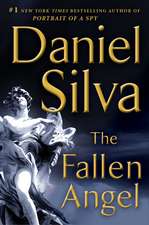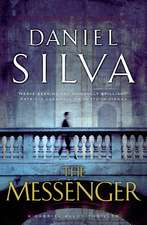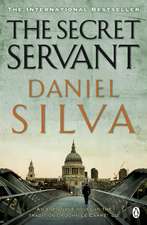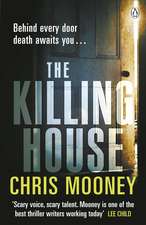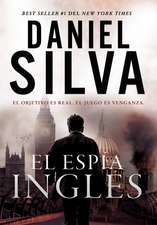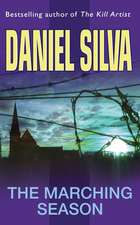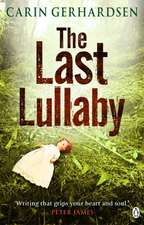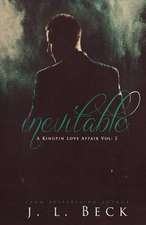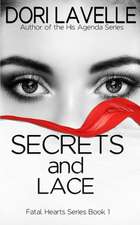Moscow Rules: Large Print Press
Autor Daniel Silvaen Limba Engleză Paperback – 30 iun 2009 – vârsta de la 18 până la 17 ani
| Toate formatele și edițiile | Preț | Express |
|---|---|---|
| Paperback (2) | 55.35 lei 24-35 zile | +28.83 lei 7-11 zile |
| Penguin Books – 29 iul 2009 | 55.35 lei 24-35 zile | +28.83 lei 7-11 zile |
| Signet Book – 31 mai 2009 | 66.59 lei 3-5 săpt. |
Preț: 123.07 lei
Nou
Puncte Express: 185
Preț estimativ în valută:
23.55€ • 25.57$ • 19.78£
23.55€ • 25.57$ • 19.78£
Carte indisponibilă temporar
Doresc să fiu notificat când acest titlu va fi disponibil:
Se trimite...
Preluare comenzi: 021 569.72.76
Specificații
ISBN-13: 9781594133367
ISBN-10: 1594133360
Pagini: 629
Dimensiuni: 137 x 213 x 33 mm
Greutate: 0.73 kg
Ediția:Text mare
Editura: Large Print Press
Seria Large Print Press
ISBN-10: 1594133360
Pagini: 629
Dimensiuni: 137 x 213 x 33 mm
Greutate: 0.73 kg
Ediția:Text mare
Editura: Large Print Press
Seria Large Print Press
Descriere
Filled with rich prose and breathtaking turns of plot, "Moscow Rules" is at once superior entertainment and a searing cautionary tale about the new threats rising to the East--and Silva's finest novel yet.
Notă biografică
Daniel Silva is the #1 New York Times-bestselling author of The Unlikely Spy, The Mark of the Assassin, The Marching Season, The Kill Artist, The English Assassin, The Confessor, A Death in Vienna, Prince of Fire, The Messenger, The Secret Servant, Moscow Rules and The Defector. He is married to NBC News Today correspondent Jamie Gangel. They have two children, Lily and Nicholas. In 2009 Silva was appointed to the United States Holocaust Memorial Museum Council.
Extras
1
COURCHEVEL, FRANCE
The invasion began, as it always did, in the last days of December. They came by armored caravan up the winding road from the floor of the Rhône Valley or descended onto the treacherous mountaintop airstrip by helicopter and private plane. Billionaires and bankers, oil tycoons and metal magnates, supermodels and spoiled children: the moneyed elite of a Russia resurgent. They streamed into the suites of the Cheval Blanc and the Byblos and commandeered the big private chalets along the rue de Bellecôte. They booked Les Caves nightclub for private all-night parties and looted the glittering shops of the Croissette. They snatched up all the best ski instructors and emptied the wineshops of their best champagne and cognac. By the morning of the twenty-eighth there was not a hair appointment to be had anywhere in town, and Le Chalet de Pierres, the famous slope-side restaurant renowned for its fire-roasted beef, had stopped taking reservations for dinner until mid-January. By New Year’s Eve, the conquest was complete. Courchevel, the exclusive ski resort high in the French Alps, was once more a village under Russian occupation.
Only the Hôtel Grand Courchevel managed to survive the onslaught from the East. Hardly surprising, devotees might have said, for, at the Grand, Russians, like those with children, were quietly encouraged to find accommodations elsewhere. Her rooms were thirty in number, modest in size, and discreet in appointment. One did not come to the Grand for gold fixtures and suites the size of football pitches. One came for a taste of Europe as it once was. One came to linger over a Campari in the lounge bar or to dawdle over coffee and Le Monde in the breakfast room. Gentlemen wore jackets to dinner and waited until after breakfast before changing into their ski attire. Conversation was conducted in a confessional murmur and with excessive courtesy. The Internet had not yet arrived at the Grand and the phones were moody. Her guests did not seem to mind; they were as genteel as the Grand herself and trended toward late middle age. A wit from one of the flashier hotels in the Jardin Alpin once described the Grand’s clientele as “the elderly and their parents.”
The lobby was small, tidy, and heated by a well-tended wood fire. To the right, near the entrance of the dining room, was Reception, a cramped alcove with brass hooks for the room keys and pigeonholes for mail and messages. Adjacent to Reception, near the Grand’s single wheezing lift, stood the concierge desk. Early in the afternoon of the second of January, it was occupied by Philippe, a neatly built former French paratrooper who wore the crossed golden keys of the International
Concierge Institute on his spotless lapel and dreamed of leaving the hotel business behind for good and settling permanently on his family’s truffle farm in Périgord. His thoughtful dark gaze was lowered toward a list of pending arrivals and departures. It contained a single entry: Lubin, Alex. Arriving by car from Geneva. Booked into Room 237. Ski rental required.
Philippe cast his seasoned concierge’s eye over the name. He had a flair for names. One had to in this line of work. Alex … short for Alexander, he reckoned. Or was it Aleksandr? Or Aleksei? He looked up and cleared his throat discreetly. An impeccably groomed head poked from Reception. It belonged to Ricardo, the afternoon manager.
“I think we have a problem,” Philippe said calmly.
Ricardo frowned. He was a Spaniard from the Basque region. He didn’t like problems.
“What is it?”
Philippe held up the arrivals sheet. “Lubin, Alex.”
Ricardo tapped a few keys on his computer with a manicured forefinger.
“Twelve nights? Ski rental required? Who took this reservation?”
“I believe it was Nadine.”
Nadine was the new girl. She worked the graveyard shift. And for the crime of granting a room to someone called Alex Lubin without first consulting Ricardo, she would do so for all eternity.
“You think he’s Russian?” Ricardo asked.
“Guilty as charged.”
Ricardo accepted the verdict without appeal. Though senior in rank, he was twenty years Philippe’s junior and had come to rely heavily upon the older man’s experience and judgment.
“Perhaps we can dump him on our competitors.”
“Not possible. There isn’t a room to be had between here and Albertville.”
“Then I suppose we’re stuck with him—unless, of course, he can be convinced to leave on his own.”
“What are you suggesting?”
“Plan B, of course.”
“It’s rather extreme, don’t you think?”
“Yes, but it’s the only way.”
The former paratrooper accepted his orders with a crisp nod and began planning the operation. It commenced at 4:12 p.m., when a dark gray Mercedes sedan with Geneva registration pulled up at the front steps and sounded its horn. Philippe remained at his pulpit for a full two minutes before donning his greatcoat at considerable leisure and heading slowly outside. By now the unwanted Monsieur Alex Lubin—twelve nights, ski rental required—had left his car and was standing angrily next to the open trunk. He had a face full of sharp angles and pale blond hair arranged carefully over a broad pate. His narrow eyes were cast downward into the trunk, toward a pair of large nylon suitcases. The concierge frowned at the bags as if he had never seen such objects before, then greeted the guest with a glacial warmth.
“May I help you, Monsieur?”
The question had been posed in English. The response came in the same language, with a distinct Slavic accent.
“I’m checking into the hotel.”
“Really? I wasn’t told about any pending arrivals this afternoon. I’m sure it was just a slipup. Why don’t you have a word with my colleague at Reception? I’m confident he’ll be able to rectify the situation.”
Lubin murmured something under his breath and tramped up the steep steps. Philippe took hold of the first bag and nearly ruptured a disk trying to hoist it out. He’s a Russian anvil salesman and he’s brought along a case filled with samples. By the time he had managed to heave the bags into the lobby, Lubin was slowly reciting his confirmation number to a perplexed-looking Ricardo, who, try as he might, had been unable to locate the reservation in question. The problem was finally resolved—“A small mistake by one of our staff, Monsieur Lubin. I’ll be certain to have a word with her”—only to be followed by another. Due to an oversight by the housekeeping staff, the room was not yet ready. “It will just be a few moments,” Ricardo said in his most silken voice. “My colleague will place your bags in the storage room. Allow me to show you to our lounge bar. There will be no charge for your drinks, of course.” There would be a charge—a rather bloated one, in fact—but Ricardo planned to spring that little surprise when Monsieur Lubin’s defenses were at their weakest.
Sadly, Ricardo’s optimism that the delay would be brief turned out to be misplaced. Indeed, ninety additional minutes would elapse before Lubin was shown, sans baggage, to his room. In accordance with Plan B, there was no bathrobe for trips to the wellness center, no vodka in the minibar, and no remote for the television. The bedside alarm clock had been set for 4:15 a.m. The heater was roaring. Philippe covertly removed the last bar of soap from the bathroom, then, after being offered no gratuity, slipped out the door, with a promise that the bags would be delivered in short order. Ricardo was waiting for him as he came off the lift.
“How many vodkas did he drink in the bar?”
“Seven,” said Ricardo.
The concierge put his teeth together and hissed contemptuously.
Only a Russian could drink seven vodkas in an hour and a half and still remain on his feet.
“What do you think?” asked Ricardo. “Mobster, spy, or hit man?”
It didn’t matter, thought Philippe gloomily. The walls of the Grand had been breached by a Russian. Resistance was now the order of the day. They retreated to their respective outposts, Ricardo to the grotto of Reception, Philippe to his pulpit near the lift. Ten minutes later came the first call from Room 237. Ricardo endured a Stalinesque tirade before murmuring a few soothing words and hanging up the phone. He looked at Philippe and smiled.
“Monsieur Lubin was wondering when his bags might arrive.”
“I’ll see to it right away,” said Philippe, smothering a yawn.
“He was also wondering whether something could be done about the heat in his room. He says it’s too warm, and the thermostat doesn’t seem to work.”
Philippe picked up his telephone and dialed Maintenance.
“Turn the heat up in Room 237,” he said. “Monsieur Lubin is cold.”
Had they witnessed the first few moments of Lubin’s stay, they would have felt certain in their belief that a miscreant was in their midst. How else to explain that he removed all the drawers from the chest and the bedside tables and unscrewed all the bulbs from the lamps and the light fixtures? Or that he stripped bare the deluxe queensize bed and pried the lid from the two-line message-center telephone? Or that he poured a complimentary bottle of mineral water into the toilet and hurled a pair of chocolates by Touvier of Geneva into the snow-filled street? Or that, having completed his rampage, he then returned the room to the near-pristine state in which he had found it?
It was because of his profession that he took these rather drastic measures, but his profession was not one of those suggested by Ricardo the receptionist. Aleksandr Viktorovich Lubin was neither a mobster nor a spy, nor a hit man, only a practitioner of the most dangerous trade one could choose in the brave New Russia: the trade of journalism. And not just any type of journalism: independent journalism. His magazine, Moskovsky Gazeta, was one of the country’s last investigative weeklies and had been a persistent stone in the shoe of the Kremlin. Its reporters and photographers were watched and harassed constantly, not only by the secret police but by the private security services of the powerful oligarchs they attempted to cover. Courchevel was now crawling with such men. Men who thought nothing of sprinkling transmitters and poisons around hotel rooms. Men who operated by the creed of Stalin: Death solves all problems. No man, no problem.
Confident the room had not been tampered with, Lubin again dialed the concierge to check on his bags and was informed they would arrive “imminently.” Then, after throwing open the balcony doors to the cold evening air, he settled himself at the writing desk and removed a file folder from his dog-eared leather briefcase. It had been given to him the previous evening by Boris Ostrovsky, the Gazeta’s editor in chief. Their meeting had taken place not in the Gazeta’s offices, which were assumed to be thoroughly bugged, but on a bench in the Arbatskaya Metro station.
I’m only going to give you part of the picture, Ostrovsky had said, handing Lubin the documents with practiced indifference. It’s for your own protection. Do you understand, Aleksandr? Lubin had understood perfectly. Ostrovsky was handing him an assignment that could get him killed.
He opened the file now and examined the photograph that lay atop the dossier. It showed a well-dressed man with cropped dark hair and a prizefighter’s rugged face standing at the side of the Russian president at a Kremlin reception. Attached to the photo was a thumbnail biography—wholly unnecessary, because Aleksandr Lubin, like every other journalist in Moscow, could recite the particulars of Ivan Borisovich Kharkov’s remarkable career from memory. Son of a senior KGB officer … graduate of the prestigious Moscow State University … boy wonder of the KGB’s Fifth Main Directorate … As the empire was crumbling, Kharkov had left the KGB and earned a fortune in banking during the anarchic early years of Russian capitalism. He had invested wisely in energy, raw materials, and real estate, and by the dawn of the millennium had joined Moscow’s growing cadre of newly minted multimillionaires. Among his many holdings was a shipping and air freight company with tentacles stretching across the Middle East, Africa, and Asia. The true size of his financial empire was impossible for an outsider to estimate. A relative newcomer to capitalism, Ivan Kharkov had mastered the art of the front company and the corporate shell.
Lubin flipped to the next page of the dossier, a glossy magazine-quality photograph of “Château Kharkov,” Ivan’s winter palace on the rue de Nogentil in Courchevel.
He spends the winter holiday there along with every other rich and famous Russian, Ostrovsky had said. Watch your step around the house. Ivan’s goons are all former Spetsnaz and OMON. Do you hear what I’m saying to you, Aleksandr? I don’t want you to end up like Irina Chernova.
Irina Chernova was the famous journalist from the Gazeta’s main rival who had exposed one of Kharkov’s shadier investments. Two nights after the article appeared, she had been shot to death by a pair of hired assassins in the elevator of her Moscow apartment building. Ostrovsky, for reasons known only to him, had included a photograph of her bullet-riddled body in the dossier. Now, as then, Lubin turned it over quickly.
Ivan usually operates behind tightly closed doors. Courchevel is one of the few places where he actually moves around in public. We want you to follow him, Aleksandr. We want to know who he’s meeting with. Who he’s skiing with. Who he’s taking to lunch. Get pictures when you can, but never approach him. And don’t tell anyone in town where you work. Ivan’s security boys can smell a reporter a mile away.
Ostrovsky had then handed Lubin an envelope containing airline tickets, a rental car reservation, and hotel accommodations. Check in with the office every couple of days, Ostrovsky had said. And try to have some fun, Aleksandr. Your colleagues are all very jealous. You get to go to Courchevel and party with the rich and famous while we freeze to death in Moscow.
On that note, Ostrovsky had risen to his feet and walked to the edge of the platform. Lubin had slipped the dossier into his briefcase and immediately broken into a drenching sweat. He was sweating again now. The damn heat! The furnace was still blazing away. He was starting to reach for the telephone to lodge another complaint when finally he heard the knock. He covered the length of the short entrance hall in two resentful strides and flung open the door without bothering to ask who was on the other side. A mistake, he thought immediately, for standing in the semidarkness of the corridor was a man of medium height, dressed in a dark ski jacket, a woolen cap, and mirrored goggles.
Lubin was wondering why anyone would wear goggles inside a hotel at night when the first blow came, a vicious sideways chop that seemed to crush his windpipe. The second strike, a well-aimed kick to the groin, caused his body to bend in half at the waist. He was able to emit no protest as the man slipped into the room and closed the door soundlessly behind him. Nor was he able to resist when the man forced him onto the bed and sat astride his hips. The knife that emerged from the inside of the ski jacket was the type wielded by elite soldiers. It entered Lubin’s abdomen just below the ribs and plunged upward toward his heart. As his chest cavity filled with blood, Lubin was forced to suffer the additional indignity of watching his own death reflected in the mirrored lenses of his killer’s goggles. The assassin released his grip on the knife and, with the weapon still lodged in Lubin’s chest, rose from the bed and calmly collected the dossier. Aleksandr Lubin felt his heart beat a final time as his killer slipped silently from the room. The heat, he was thinking. The damn heat . . .
It was shortly after seven when Philippe finally collected Monsieur Lubin’s bags from storage and loaded them onto the lift. Arriving at Room 237, he found the do not disturb sign hanging from the latch. In accordance with the conventions of Plan B, he gave the door three thunderous knocks. Receiving no reply, he drew his passkey from his pocket and entered, just far enough to see two size-twelve Russian loafers hanging a few inches off the end the bed. He left the bags in the entrance hall and returned to the lobby, where he delivered a report of his findings to Ricardo.
“Passed out drunk.”
The Spaniard glanced at his watch. “It’s early, even for a Russian. What now?”
“We’ll let him sleep it off. In the morning, when he’s good and hungover, we’ll initiate Phase Two.”
The Spaniard smiled. No guest had ever survived Phase Two. Phase Two was always fatal.
COURCHEVEL, FRANCE
The invasion began, as it always did, in the last days of December. They came by armored caravan up the winding road from the floor of the Rhône Valley or descended onto the treacherous mountaintop airstrip by helicopter and private plane. Billionaires and bankers, oil tycoons and metal magnates, supermodels and spoiled children: the moneyed elite of a Russia resurgent. They streamed into the suites of the Cheval Blanc and the Byblos and commandeered the big private chalets along the rue de Bellecôte. They booked Les Caves nightclub for private all-night parties and looted the glittering shops of the Croissette. They snatched up all the best ski instructors and emptied the wineshops of their best champagne and cognac. By the morning of the twenty-eighth there was not a hair appointment to be had anywhere in town, and Le Chalet de Pierres, the famous slope-side restaurant renowned for its fire-roasted beef, had stopped taking reservations for dinner until mid-January. By New Year’s Eve, the conquest was complete. Courchevel, the exclusive ski resort high in the French Alps, was once more a village under Russian occupation.
Only the Hôtel Grand Courchevel managed to survive the onslaught from the East. Hardly surprising, devotees might have said, for, at the Grand, Russians, like those with children, were quietly encouraged to find accommodations elsewhere. Her rooms were thirty in number, modest in size, and discreet in appointment. One did not come to the Grand for gold fixtures and suites the size of football pitches. One came for a taste of Europe as it once was. One came to linger over a Campari in the lounge bar or to dawdle over coffee and Le Monde in the breakfast room. Gentlemen wore jackets to dinner and waited until after breakfast before changing into their ski attire. Conversation was conducted in a confessional murmur and with excessive courtesy. The Internet had not yet arrived at the Grand and the phones were moody. Her guests did not seem to mind; they were as genteel as the Grand herself and trended toward late middle age. A wit from one of the flashier hotels in the Jardin Alpin once described the Grand’s clientele as “the elderly and their parents.”
The lobby was small, tidy, and heated by a well-tended wood fire. To the right, near the entrance of the dining room, was Reception, a cramped alcove with brass hooks for the room keys and pigeonholes for mail and messages. Adjacent to Reception, near the Grand’s single wheezing lift, stood the concierge desk. Early in the afternoon of the second of January, it was occupied by Philippe, a neatly built former French paratrooper who wore the crossed golden keys of the International
Concierge Institute on his spotless lapel and dreamed of leaving the hotel business behind for good and settling permanently on his family’s truffle farm in Périgord. His thoughtful dark gaze was lowered toward a list of pending arrivals and departures. It contained a single entry: Lubin, Alex. Arriving by car from Geneva. Booked into Room 237. Ski rental required.
Philippe cast his seasoned concierge’s eye over the name. He had a flair for names. One had to in this line of work. Alex … short for Alexander, he reckoned. Or was it Aleksandr? Or Aleksei? He looked up and cleared his throat discreetly. An impeccably groomed head poked from Reception. It belonged to Ricardo, the afternoon manager.
“I think we have a problem,” Philippe said calmly.
Ricardo frowned. He was a Spaniard from the Basque region. He didn’t like problems.
“What is it?”
Philippe held up the arrivals sheet. “Lubin, Alex.”
Ricardo tapped a few keys on his computer with a manicured forefinger.
“Twelve nights? Ski rental required? Who took this reservation?”
“I believe it was Nadine.”
Nadine was the new girl. She worked the graveyard shift. And for the crime of granting a room to someone called Alex Lubin without first consulting Ricardo, she would do so for all eternity.
“You think he’s Russian?” Ricardo asked.
“Guilty as charged.”
Ricardo accepted the verdict without appeal. Though senior in rank, he was twenty years Philippe’s junior and had come to rely heavily upon the older man’s experience and judgment.
“Perhaps we can dump him on our competitors.”
“Not possible. There isn’t a room to be had between here and Albertville.”
“Then I suppose we’re stuck with him—unless, of course, he can be convinced to leave on his own.”
“What are you suggesting?”
“Plan B, of course.”
“It’s rather extreme, don’t you think?”
“Yes, but it’s the only way.”
The former paratrooper accepted his orders with a crisp nod and began planning the operation. It commenced at 4:12 p.m., when a dark gray Mercedes sedan with Geneva registration pulled up at the front steps and sounded its horn. Philippe remained at his pulpit for a full two minutes before donning his greatcoat at considerable leisure and heading slowly outside. By now the unwanted Monsieur Alex Lubin—twelve nights, ski rental required—had left his car and was standing angrily next to the open trunk. He had a face full of sharp angles and pale blond hair arranged carefully over a broad pate. His narrow eyes were cast downward into the trunk, toward a pair of large nylon suitcases. The concierge frowned at the bags as if he had never seen such objects before, then greeted the guest with a glacial warmth.
“May I help you, Monsieur?”
The question had been posed in English. The response came in the same language, with a distinct Slavic accent.
“I’m checking into the hotel.”
“Really? I wasn’t told about any pending arrivals this afternoon. I’m sure it was just a slipup. Why don’t you have a word with my colleague at Reception? I’m confident he’ll be able to rectify the situation.”
Lubin murmured something under his breath and tramped up the steep steps. Philippe took hold of the first bag and nearly ruptured a disk trying to hoist it out. He’s a Russian anvil salesman and he’s brought along a case filled with samples. By the time he had managed to heave the bags into the lobby, Lubin was slowly reciting his confirmation number to a perplexed-looking Ricardo, who, try as he might, had been unable to locate the reservation in question. The problem was finally resolved—“A small mistake by one of our staff, Monsieur Lubin. I’ll be certain to have a word with her”—only to be followed by another. Due to an oversight by the housekeeping staff, the room was not yet ready. “It will just be a few moments,” Ricardo said in his most silken voice. “My colleague will place your bags in the storage room. Allow me to show you to our lounge bar. There will be no charge for your drinks, of course.” There would be a charge—a rather bloated one, in fact—but Ricardo planned to spring that little surprise when Monsieur Lubin’s defenses were at their weakest.
Sadly, Ricardo’s optimism that the delay would be brief turned out to be misplaced. Indeed, ninety additional minutes would elapse before Lubin was shown, sans baggage, to his room. In accordance with Plan B, there was no bathrobe for trips to the wellness center, no vodka in the minibar, and no remote for the television. The bedside alarm clock had been set for 4:15 a.m. The heater was roaring. Philippe covertly removed the last bar of soap from the bathroom, then, after being offered no gratuity, slipped out the door, with a promise that the bags would be delivered in short order. Ricardo was waiting for him as he came off the lift.
“How many vodkas did he drink in the bar?”
“Seven,” said Ricardo.
The concierge put his teeth together and hissed contemptuously.
Only a Russian could drink seven vodkas in an hour and a half and still remain on his feet.
“What do you think?” asked Ricardo. “Mobster, spy, or hit man?”
It didn’t matter, thought Philippe gloomily. The walls of the Grand had been breached by a Russian. Resistance was now the order of the day. They retreated to their respective outposts, Ricardo to the grotto of Reception, Philippe to his pulpit near the lift. Ten minutes later came the first call from Room 237. Ricardo endured a Stalinesque tirade before murmuring a few soothing words and hanging up the phone. He looked at Philippe and smiled.
“Monsieur Lubin was wondering when his bags might arrive.”
“I’ll see to it right away,” said Philippe, smothering a yawn.
“He was also wondering whether something could be done about the heat in his room. He says it’s too warm, and the thermostat doesn’t seem to work.”
Philippe picked up his telephone and dialed Maintenance.
“Turn the heat up in Room 237,” he said. “Monsieur Lubin is cold.”
Had they witnessed the first few moments of Lubin’s stay, they would have felt certain in their belief that a miscreant was in their midst. How else to explain that he removed all the drawers from the chest and the bedside tables and unscrewed all the bulbs from the lamps and the light fixtures? Or that he stripped bare the deluxe queensize bed and pried the lid from the two-line message-center telephone? Or that he poured a complimentary bottle of mineral water into the toilet and hurled a pair of chocolates by Touvier of Geneva into the snow-filled street? Or that, having completed his rampage, he then returned the room to the near-pristine state in which he had found it?
It was because of his profession that he took these rather drastic measures, but his profession was not one of those suggested by Ricardo the receptionist. Aleksandr Viktorovich Lubin was neither a mobster nor a spy, nor a hit man, only a practitioner of the most dangerous trade one could choose in the brave New Russia: the trade of journalism. And not just any type of journalism: independent journalism. His magazine, Moskovsky Gazeta, was one of the country’s last investigative weeklies and had been a persistent stone in the shoe of the Kremlin. Its reporters and photographers were watched and harassed constantly, not only by the secret police but by the private security services of the powerful oligarchs they attempted to cover. Courchevel was now crawling with such men. Men who thought nothing of sprinkling transmitters and poisons around hotel rooms. Men who operated by the creed of Stalin: Death solves all problems. No man, no problem.
Confident the room had not been tampered with, Lubin again dialed the concierge to check on his bags and was informed they would arrive “imminently.” Then, after throwing open the balcony doors to the cold evening air, he settled himself at the writing desk and removed a file folder from his dog-eared leather briefcase. It had been given to him the previous evening by Boris Ostrovsky, the Gazeta’s editor in chief. Their meeting had taken place not in the Gazeta’s offices, which were assumed to be thoroughly bugged, but on a bench in the Arbatskaya Metro station.
I’m only going to give you part of the picture, Ostrovsky had said, handing Lubin the documents with practiced indifference. It’s for your own protection. Do you understand, Aleksandr? Lubin had understood perfectly. Ostrovsky was handing him an assignment that could get him killed.
He opened the file now and examined the photograph that lay atop the dossier. It showed a well-dressed man with cropped dark hair and a prizefighter’s rugged face standing at the side of the Russian president at a Kremlin reception. Attached to the photo was a thumbnail biography—wholly unnecessary, because Aleksandr Lubin, like every other journalist in Moscow, could recite the particulars of Ivan Borisovich Kharkov’s remarkable career from memory. Son of a senior KGB officer … graduate of the prestigious Moscow State University … boy wonder of the KGB’s Fifth Main Directorate … As the empire was crumbling, Kharkov had left the KGB and earned a fortune in banking during the anarchic early years of Russian capitalism. He had invested wisely in energy, raw materials, and real estate, and by the dawn of the millennium had joined Moscow’s growing cadre of newly minted multimillionaires. Among his many holdings was a shipping and air freight company with tentacles stretching across the Middle East, Africa, and Asia. The true size of his financial empire was impossible for an outsider to estimate. A relative newcomer to capitalism, Ivan Kharkov had mastered the art of the front company and the corporate shell.
Lubin flipped to the next page of the dossier, a glossy magazine-quality photograph of “Château Kharkov,” Ivan’s winter palace on the rue de Nogentil in Courchevel.
He spends the winter holiday there along with every other rich and famous Russian, Ostrovsky had said. Watch your step around the house. Ivan’s goons are all former Spetsnaz and OMON. Do you hear what I’m saying to you, Aleksandr? I don’t want you to end up like Irina Chernova.
Irina Chernova was the famous journalist from the Gazeta’s main rival who had exposed one of Kharkov’s shadier investments. Two nights after the article appeared, she had been shot to death by a pair of hired assassins in the elevator of her Moscow apartment building. Ostrovsky, for reasons known only to him, had included a photograph of her bullet-riddled body in the dossier. Now, as then, Lubin turned it over quickly.
Ivan usually operates behind tightly closed doors. Courchevel is one of the few places where he actually moves around in public. We want you to follow him, Aleksandr. We want to know who he’s meeting with. Who he’s skiing with. Who he’s taking to lunch. Get pictures when you can, but never approach him. And don’t tell anyone in town where you work. Ivan’s security boys can smell a reporter a mile away.
Ostrovsky had then handed Lubin an envelope containing airline tickets, a rental car reservation, and hotel accommodations. Check in with the office every couple of days, Ostrovsky had said. And try to have some fun, Aleksandr. Your colleagues are all very jealous. You get to go to Courchevel and party with the rich and famous while we freeze to death in Moscow.
On that note, Ostrovsky had risen to his feet and walked to the edge of the platform. Lubin had slipped the dossier into his briefcase and immediately broken into a drenching sweat. He was sweating again now. The damn heat! The furnace was still blazing away. He was starting to reach for the telephone to lodge another complaint when finally he heard the knock. He covered the length of the short entrance hall in two resentful strides and flung open the door without bothering to ask who was on the other side. A mistake, he thought immediately, for standing in the semidarkness of the corridor was a man of medium height, dressed in a dark ski jacket, a woolen cap, and mirrored goggles.
Lubin was wondering why anyone would wear goggles inside a hotel at night when the first blow came, a vicious sideways chop that seemed to crush his windpipe. The second strike, a well-aimed kick to the groin, caused his body to bend in half at the waist. He was able to emit no protest as the man slipped into the room and closed the door soundlessly behind him. Nor was he able to resist when the man forced him onto the bed and sat astride his hips. The knife that emerged from the inside of the ski jacket was the type wielded by elite soldiers. It entered Lubin’s abdomen just below the ribs and plunged upward toward his heart. As his chest cavity filled with blood, Lubin was forced to suffer the additional indignity of watching his own death reflected in the mirrored lenses of his killer’s goggles. The assassin released his grip on the knife and, with the weapon still lodged in Lubin’s chest, rose from the bed and calmly collected the dossier. Aleksandr Lubin felt his heart beat a final time as his killer slipped silently from the room. The heat, he was thinking. The damn heat . . .
It was shortly after seven when Philippe finally collected Monsieur Lubin’s bags from storage and loaded them onto the lift. Arriving at Room 237, he found the do not disturb sign hanging from the latch. In accordance with the conventions of Plan B, he gave the door three thunderous knocks. Receiving no reply, he drew his passkey from his pocket and entered, just far enough to see two size-twelve Russian loafers hanging a few inches off the end the bed. He left the bags in the entrance hall and returned to the lobby, where he delivered a report of his findings to Ricardo.
“Passed out drunk.”
The Spaniard glanced at his watch. “It’s early, even for a Russian. What now?”
“We’ll let him sleep it off. In the morning, when he’s good and hungover, we’ll initiate Phase Two.”
The Spaniard smiled. No guest had ever survived Phase Two. Phase Two was always fatal.







